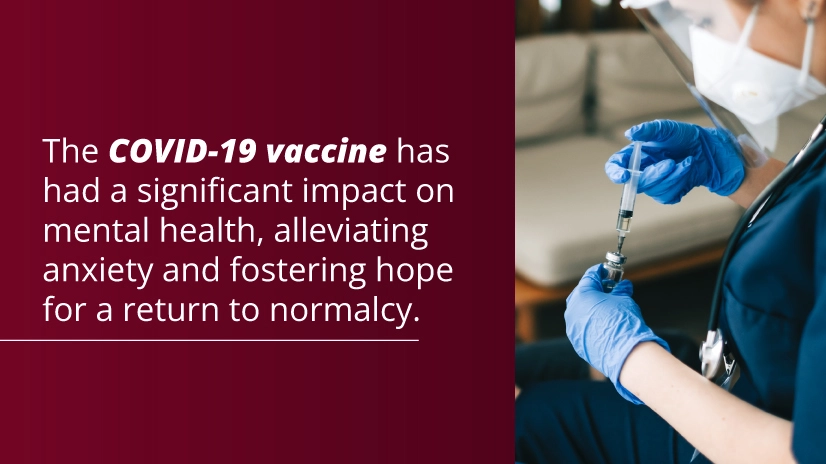
The Impact of COVID Vaccination on Mental Well-being
The COVID-19 pandemic brought major changes to our lives, including the development and distribution of vaccines aimed at controlling the virus. While vaccines have been vital in combating the spread of COVID-19, their rollout and ongoing discussions have also sparked various mental health considerations.
Understanding these impacts is essential as we navigate the complexities of public health responses and individual well-being. This article explores the intersection of COVID-19 vaccination and mental health, offering insights into how these vaccines have influenced our mental health status.
Key Takeaways
Understanding COVID-19 and its vaccines is crucial for navigating public health challenges. Here is what this article talks about:
- Receiving the vaccine has varied psychological effects, including relief from fear and anxiety and improved mental well-being post-vaccination.
- Research shows that vaccination generally improves mental health outcomes, reducing stress levels and anxiety among vaccinated individuals.
- Effective strategies, support systems, and educational campaigns are crucial in addressing vaccine-related anxiety and promoting vaccine acceptance.
Indiana Center for Recovery offers comprehensive mental health treatment programs to support your journey to wellness—call (844) 650-0064 today.

Overview Of COVID-19 Vaccines
During the COVID-19 pandemic, several types of vaccines were developed to combat the virus, each with unique characteristics and methods of administration.
Types Of COVID-19 Vaccines
Several types of COVID-19 vaccines were developed, including mRNA vaccines like Pfizer-BioNTech and Moderna, viral vector vaccines such as Johnson & Johnson’s Janssen vaccine, and protein subunit vaccines like Novavax. Each type works differently but aims to stimulate the immune system against coronavirus disease.
Efficacy And Safety Of COVID-19 Vaccines
Research shows that COVID-19 vaccines are highly effective in avoiding severe illness and reducing transmission rates. Clinical trials demonstrate their safety profile, with common side effects like sore arms, fatigue, and mild flu-like symptoms lasting only a few days. Monitoring continues to ensure ongoing safety.
Vaccine Distribution And Accessibility
Ensuring equitable distribution and accessibility of COVID-19 vaccines has been a global challenge. Efforts have included mass vaccination sites, mobile clinics, and partnerships with pharmacies to reach diverse populations across the United States, addressing barriers like transportation and vaccine hesitancy.
In short, COVID-19 vaccines represent a significant milestone in public health. Understanding their types, efficacy, safety, and accessibility helps in promoting widespread vaccination and community well-being.
Mental Health During The COVID-19 Pandemic
As the world navigated the COVID-19 pandemic, its impact extended beyond physical health, significantly affecting global mental well-being. Let’s dig into the details:
Impact Of COVID-19 On Global Mental Health
During the COVID-19 pandemic, many experienced heightened levels of anxiety and stress due to fears of infection, social isolation, and economic uncertainty. Lockdowns and social distancing measures led to a higher risk of experiencing feelings of loneliness and depressive symptoms, exacerbating existing psychiatric disorders for many.
Common Mental Health Issues During The Pandemic
During the COVID-19 pandemic, many people experienced common mental health problems such as anxiety disorders, major depressive disorder, and post-traumatic stress reactions. These challenges were exacerbated by concerns over health, financial stability, and social isolation, affecting mental well-being on a widespread scale.
Coping Mechanisms And Mental Health Resources
Coping mechanisms such as maintaining routines, staying connected with loved ones virtually, and practicing mindfulness helped alleviate the impact of the COVID-19 pandemic on mental health. Access to mental health resources, including teletherapy, online support groups, and mental health crisis hotlines, played a role in providing support and treatment options.
In summary, while the pandemic has posed significant challenges to global mental health, understanding its impacts and using available resources can aid in navigating these difficult times.
Psychological Impact Of Receiving The Vaccine
As COVID-19 vaccinations became widely available, they brought about a mix of emotions and psychological responses among the general population.
Relief And Anxiety Associated With Getting Vaccinated
Getting vaccinated against COVID-19 can evoke a mix of emotions. Many people experience relief knowing they are protecting themselves and others from the virus. However, some may also feel anxious about potential side effects or the vaccine’s effectiveness. It’s normal to have these feelings, and staying informed can help manage anxiety.
Stress Levels And Mental Well-Being Post-Vaccination
After receiving the COVID-19 vaccine, people of all age groups, including children, adults, and old, often report a reduction in stress levels. This can stem from a decreased fear of contracting the virus or transmitting it to loved ones. Improved mental well-being is commonly noted, as vaccination offers a sense of control over one’s health and contributes to societal efforts to curb the pandemic.
Personal Narratives
Personal experiences with COVID-19 vaccination vary widely. Some individuals share stories of relief and renewed social engagement, while others discuss lingering concerns or side effects. These narratives highlight the diverse psychological impacts of vaccination and underscore the importance of addressing individual concerns through factual information and support.
In conclusion, the psychological impact of receiving the COVID-19 vaccine varies widely among individuals, encompassing relief, anxiety, and improved mental well-being.
Vaccination And Mental Health Outcomes
As COVID-19 vaccination efforts continue, research into the mental health effects post-vaccination provides valuable insights into public perceptions and well-being.
Surveys And Studies On Mental Health Post-Vaccination
Recent surveys and research studies delve into mental health post-vaccination, highlighting both positive and negative impacts. These previous studies explore changes in anxiety levels, stress responses, and overall psychological well-being following vaccination. Researchers aim to discern whether vaccination contributes positively or negatively to mental health symptoms.
Mental Health In Vaccinated Vs. Unvaccinated Individuals
Data from comparative studies between vaccinated and unvaccinated groups indicate significant differences. Vaccinated individuals often experience a sense of protection and relief, which contributes positively to their mental well-being. In contrast, vaccine hesitancy among the unvaccinated can result in prolonged anxiety and uncertainty, which negatively affects mental health.
Vaccine Hesitancy And Its Mental Health Implications
Vaccine hesitancy significantly influences mental health outcomes. Those hesitant about vaccines are at an increased risk of experiencing heightened anxiety due to perceived risks or misinformation, impacting their overall well-being. Addressing vaccine hesitancy requires tailored strategies that acknowledge and alleviate concerns while promoting informed decision-making.
In summary, ongoing research underscores the positive mental health impacts of COVID-19 vaccination while highlighting disparities between vaccinated and unvaccinated populations.
Addressing Mental Health Concerns Related To Vaccination
The rollout of COVID-19 vaccines has brought hope for ending the pandemic, yet it also brings about various mental health concerns that need attention and support.
Strategies For Reducing Vaccine Anxiety
Vaccine anxiety is common and can be managed through various effective strategies. It’s helpful to stay informed with reliable sources, focus on the benefits of vaccination, and talk openly with healthcare providers about any concerns. Engaging in relaxation techniques such as deep breath exercises or mindfulness can also alleviate stress and anxiety symptoms.
Support Systems For Individuals Experiencing Vaccine-Related Stress
Having a strong support system is essential for those experiencing stress related to vaccination. Friends, family, and online communities can provide emotional support and share experiences. Healthcare professionals play a vital part in offering guidance and addressing concerns, ensuring individuals feel heard and supported throughout the vaccination process.
Educational Campaigns To Alleviate Fear And Misconceptions
Educational campaigns are vital in dispelling fears and misconceptions surrounding COVID-19 vaccines. Clear, accessible information about vaccine safety, efficacy, and side effects can help individuals make well-informed decisions. These campaigns should address common myths and provide facts backed by scientific evidence, fostering trust and confidence in vaccination efforts.
In short, addressing mental health concerns related to COVID-19 vaccination requires proactive strategies, robust support systems, and comprehensive educational efforts.
Role Of Healthcare Providers
As COVID-19 vaccination efforts continue, healthcare providers play a pivotal role in supporting mental health alongside physical well-being. Here’s how they contribute:
Professionals’ Involvement In Vaccination Campaigns
Integrating mental health professionals into vaccination campaigns ensures that individuals receive comprehensive support. These professionals can offer counseling services to address vaccine-related anxieties, provide coping strategies, and assess mental health needs pre- and post-vaccination. Their expertise contributes to a holistic approach that prioritizes mental health.
Training Healthcare Workers To Address Mental Issues
Effective training programs for healthcare workers are essential to equip them with the skills to address serious mental illness related to COVID-19 vaccination. This training should include strategies for empathetic communication, recognizing signs of psychological distress, and providing appropriate resources and referrals to mental health services when needed.
Best Practices For Holistic Patient Care
Holistic patient care involves integrating mental health support into vaccination services. Healthcare providers should prioritize clear communication about vaccine safety and efficacy, fostering trust and reducing anxiety. They should also create supportive environments that validate patients’ concerns while providing accurate information to empower informed decision-making.
In conclusion, healthcare providers play a crucial role in supporting mental health throughout COVID-19 vaccination efforts. They contribute to promoting vaccine acceptance and ensuring overall well-being.
Frequently Asked Questions (FAQ)
What mental health disorders are linked to COVID?
Several mental health disorders have been linked to COVID-19, including anxiety, depression, and post-traumatic stress disorder (PTSD). The stress and uncertainty caused by the COVID-19 pandemic have contributed to increased feelings of anxiety and sadness in many people.
In addition, those who have contracted COVID-19 or have been directly affected by it may experience symptoms of PTSD, such as flashbacks or heightened anxiety. These mental disorders highlight the importance of seeking support and resources to cope with the emotional impact of the pandemic.
Can COVID-19 affect your mental health long term?
COVID-19 can affect your mental health long term. Some people may continue to experience the symptoms of depression, anxiety, or PTSD even after recovering physically from the virus. The stress of illness, isolation, and uncertainty about the future can contribute to ongoing mental health challenges.
It’s essential to seek help if you’re struggling emotionally, as there are resources and treatments available to support your well-being. Taking care of your mental health is just as important as taking care of your physical health, especially during and after the COVID-19 pandemic.
Get Expert Help At Indiana Center for Recovery
No matter if you are struggling with anxiety, depression, bipolar disorder, schizophrenia, or any other mental health issue, here is some good news: Indiana Center for Recovery is dedicated to helping you navigate through these difficulties.
Our inpatient psychiatric services are tailored to address complex mental health needs with compassion and expertise. You’ll have access to a variety of proven therapies, expert medication management, innovative TMS therapy, and family counseling—all designed to help you on your journey to mental wellness.
In case someone’s severe mental illness has led to substance use disorder (SUD), our dual diagnosis program offers specialized care to address both issues simultaneously, ensuring comprehensive support for recovery.
Don’t wait any longer. Dial (844) 650-0064 to discover how we can assist you in reclaiming your overcome psychiatric symptoms. You deserve support, and we’re here to help every step of the way.


 100% Confidential
100% Confidential
